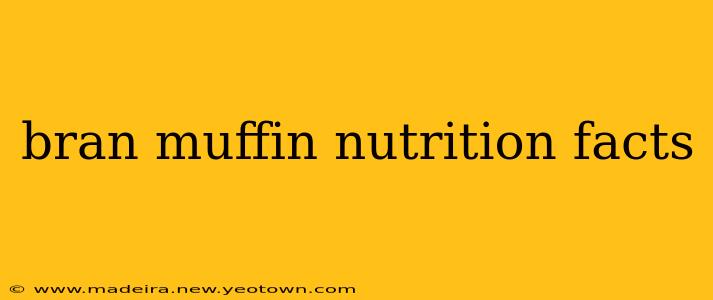Let's be honest, the aroma of a warm bran muffin is enough to make anyone's mouth water. But beyond the delightful scent and taste, lies a nutritional powerhouse often overlooked. This isn't your average sugary muffin; bran muffins, when made correctly, offer a surprisingly wholesome and satisfying breakfast or snack. Let's delve into the nutritional profile of these often-underestimated baked goods and uncover why they might just deserve a prominent spot in your diet.
What are the nutritional benefits of bran muffins?
The nutritional benefits of bran muffins stem primarily from their key ingredient: bran. Bran, the outer layer of the wheat kernel, is a fantastic source of dietary fiber. This fiber is crucial for digestive health, aiding regularity and preventing constipation. Beyond fiber, bran is also packed with essential nutrients like iron, magnesium, and various B vitamins. However, the overall nutritional content can vary significantly depending on the specific recipe. A muffin made with whole wheat flour, oats, and minimal added sugar will offer a much healthier profile compared to a commercially produced muffin loaded with sugar and unhealthy fats.
How many calories are in a bran muffin?
The calorie count of a bran muffin can range considerably. A homemade bran muffin, focusing on whole grains and less sugar, might clock in around 150-200 calories. However, store-bought bran muffins can easily surpass 300 calories per muffin, often due to the inclusion of added sugars, oils, and refined flour. Always check the nutrition label to make an informed decision. Paying attention to serving size is crucial as well; one muffin might be considered a single serving, while others are packaged as larger portions.
Are bran muffins good for weight loss?
Bran muffins can be part of a weight loss plan, but it's crucial to choose wisely. The high fiber content promotes satiety, meaning you'll feel fuller for longer, potentially reducing overall calorie intake. The fiber also helps regulate blood sugar levels, preventing those mid-morning energy crashes that can lead to unhealthy snacking. However, the added sugars and unhealthy fats in many commercially available bran muffins can negate these benefits. Opting for a homemade version with whole grains and limited added sugars is key to maximizing the weight-loss potential.
Are bran muffins good for diabetics?
The answer to this question is nuanced and depends on several factors. The high fiber content in bran muffins can help regulate blood sugar levels, slowing down the absorption of glucose. However, the presence of added sugars can significantly impact this benefit. Diabetics should choose bran muffins carefully, prioritizing those with minimal added sugar and a high fiber content. Consulting with a doctor or registered dietitian is always recommended to determine how bran muffins fit into a personalized diabetic diet plan.
What are the ingredients in a bran muffin?
The ingredients in a bran muffin can vary, but typical components include bran (obviously!), flour (often whole wheat), eggs, milk (or a milk alternative), oil or butter, sugar (ideally minimal), and leavening agents like baking powder or baking soda. Some recipes also incorporate fruits, nuts, or spices to add flavor and nutritional value. Reading the ingredient list carefully is essential to identify potential allergens and to assess the overall quality and healthiness of the muffin.
How many grams of fiber are in a bran muffin?
The fiber content of a bran muffin can fluctuate depending on the recipe and ingredients used. A homemade bran muffin might contain anywhere from 3 to 5 grams of fiber per muffin, while store-bought versions might offer less, depending on the ingredients. The higher the fiber content, the greater the contribution to digestive health and feelings of fullness. Always check the nutrition label for accurate information.
In conclusion, bran muffins can be a healthy and delicious addition to your diet. By making informed choices about the type of muffin you consume and being mindful of portion sizes, you can enjoy the nutritional benefits of this fiber-rich treat. Remember, homemade is often best when focusing on maximizing the nutritional benefits and minimizing added sugars and unhealthy fats.

